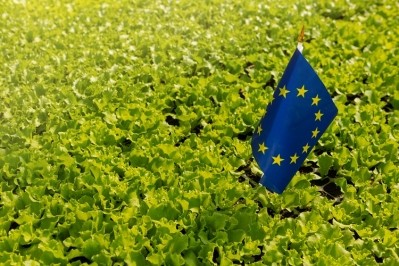EU tables first-ever soil law for food system resilience, but is it bold enough?

The European Union aims to achieve healthy soils by 2050, but research suggests it has a way to go yet.
Over 60% of European soils are currently considered unhealthy, with scientific evidence showing that soils are further degrading due to unsustainable management of land, sealing, contamination and overexploitation. These factors can be exacerbated by climate change and extreme weather events.
To address these key soil threats, a new regulation proposal has been adopted by the European Commission. The Soil Monitoring Law provides a legal framework that aims to help achieve healthy soils by 2050.
The problem and proposed solution
Soil degradation is one of the major drivers of the climate and biodiversity crises. It is also economically damaging: soil degradation costs billions of estimated €50bn-plus per year due to the loss of essential services they provide.
Ecosystem services include food, feed, fibre, timber, nutrient cycling, carbon sequestration, pest control and water regulation. Degraded soils also intensify the pressure on the remaining healthy soils, which comes at a cost to farmers and affects the capacity to produce healthy and nutritious food.
The EU expects that by regenerating soils and ensuring their sustainable use, the resilience of European food and farming will be strengthened, and costs from soil degradation reduced.
“Farmers will benefit because their livelihoods and future depend on the long-term health of the soils on which crops are growing and livestock is grazing. Ninety-five percent of our food is directly or indirectly produced on soils. Soil erosion can cause a yearly agricultural productivity loss of €1.25bn per year in the EU,” noted the European Commission.
The increased uptake of sustainable management practices is expected to maintain or improve soil fertility, productivity and yields.

So how will the Soil Monitoring Law help achieve healthy soils?
The proposed approach is at least three-fold. If approved, the law will put in place a monitoring framework for all soils across the EU so that Member States can take measures to regenerate degraded soils.
It also aims to make sustainable soil management the norm in the EU. Member States will have to define which practices should be implemented by soil managers and which should be banned due to causing soil degradation.
The law would also request Member States identify potentially contaminated sites, investigate those sites, and address unacceptable risks for human health and the environment – thereby contributing to a toxic-free environment (in line with the EU Zero Pollution ambition) by 2050.
Disappointment at ‘lack of ambition’
That the European Commission has adopted a Soil Monitoring Law is being well received.
European Environmental Bureau (EEB), which represents environmental citizens’ organisations in Europe, welcomes the publication of the proposal of the Soil Law, describing it as a ‘first step’ towards the EU commitment to protect and restore soils.
What the NGO takes issue with is the name of the proposed directive (the Soil Monitoring Law), which was originally called the ‘Soil Health Law’. According to EEB, this name change demonstrates that the main aim of the directive has been limited to monitoring the state of soils across the EU, not to restore Europe’s soils back to good health.
“This is very disappointing and once again leaves the health of our soils up to chance."
To ‘effectively’ improve the state of European sales and put soil health into focus, EEB is calling for the proposal to be ‘significantly improved’.
“While we welcome the publication of this crucial piece of legislation, we are disappointed with the lack of ambition. Soil ecosystems are one of our most important lifelines in the face of the climate, biodiversity, and pollution crises. Unfortunately, the proposal falls short of expectations by not including legally binding targets or requiring mandatory plans and by not sufficiently recognising the functional role of soil biodiversity,” said Caroline Heinzel, associate policy officer for soil at the European Environmental Bureau.
“Renaming the ‘Soil Law’ suggests the focus has switched to simply observing soil health rather than ensuring its improvement. Now it’s up to the co-legislators to make the necessary changes to ensure that it becomes an effective tool to urgently protect and restore the health of EU soils!”
Insufficient ambition is also being targeted by member organisation One Planet Business for Biodiversity (OP2B).
The business coalition – whose members include Nestlé, Danone, and Unilever, amongst others – welcomes the initiative, but contests the EU needs to go further to ‘tackle the trend of deteriorating soil health in Europe’.
OP2B laments that the tabled law ‘fails to propose an ambitious framework for coordinated development of soil health at the European level’. Without clear guidance and a unified framework, the proposal does not set out the path for a harmonised and coordinated scaling up across all European countries, the coalition noted.
‘Adequate funding required’
Another concern flagged lies in access to funding. According to trade association FoodDrinkEurope (FDE), which represents food and beverage manufacturers across Europe, a ‘significant’ financing gap exists in meeting the EU’s ambitions for better soil health.
“For example, an estimated €8bn a year is needed to help farmers transition to more sustainable farming, including better soil management, and agri-food businesses face a finance gap of at least €12.5bn in unmet loan demands,” according to FDE director general Dirk Jacobs.
Adequate funding will help de-risk farmers to move to sustainable practices while safeguarding their income and productivity, believes the trade association.
“While the proposed soil law provides a good basis for soil descriptors, indicators and sustainable soil management practices, it falls short on clear guidelines and innovative tools for soil use and restoration by actors of the agri-food chain,” said Jacobs.

Calls to strengthen the financial component of the proposal to achieve the proposed transition effectively have also been heard from OP2B.
“We very much value the importance the Commission gives to agriculture and its central role in the management of soil. Still, we would have appreciated the Commission grasping the magnitude of the efforts need to move to sustainable management practices and mobilise the necessary funds to support the transition to regenerative agriculture at scale,” said OP2B director Stefania Avanzini.
OP2B member Nestlé agrees. “The EU must ensure that more funding is directed to farmers to support them in restoring soil health and improve biodiversity through their production system,” noted Pascal Chapot, group head of sustainable agriculture development at the Swiss food major.








